Weber SmokeFire EX4 review: this do-it-all pellet barbecue sears, smokes and grills up a storm
One or two minor niggles aside, the new Weber SmokeFire pellet grill is a winner


The Weber SmokeFire EX4 pellet grill impresses with a raft of distinctive features that make the act of grilling, smoking and even searing a pleasurable breeze. It’s built like a brick outhouse, is really easy to use and it looks more stylish than any other pellet grill currently on the market.
-
+
Big stainless steel grate
-
+
Fuss free grilling and smoking
-
+
It sears steaks too
-
+
Top build quality
-
-
Temperature not consistent across the grate
-
-
Dripping fats can be an issue
-
-
App needs improving
Why you can trust T3

We have been looking forward to running a Weber Smokefire EX4 review ever since we first heard Weber was moving into pellet grills – plus a side order of smart technology – with the SmokeFire grill range. However, before we start extolling the virtues of this new barbecue from Weber, we should add that we too have read some of the negative reviews of the first batch of SmokeFires that went on sale, and we address those below.
Thankfully, Weber has rectified the biggest issues that some owners have had so that all new models of its SmokeFire EX4 should now work as advertised. That is certainly the case with our review model which has performed fault-free in every test we’ve thrown at it, be it grilling, searing or smoking.
It's also now won 2020's T3 Award for Best Barbecue, too!
Where to buy Weber Smokefire
Weber SmokeFire EX4 and its big brother Weber Smokefire EX6 are in short supply in the UK, and little wonder. However you can still buy them from, logically enough, Weber itself.
• Buy Weber SmokeFire EX4 for £1,199 with free delivery and two free accessories
• Buy Weber SmokeFire EX6 for £1,449 with free delivery and two free accessories
You can also buy Weber SmokeFire EX4 now in the UK for £1,199 at John Lewis – they only have 4 left, the last time we looked.
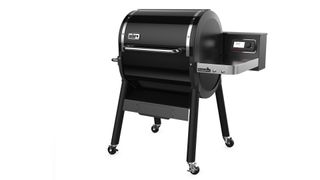
The new Weber SmokeFire EX4
Weber SmokeFire EX4 review: why should I want a pellet barbecue?
There are three main types of barbecue fuel: charcoal, gas and hardwood pellets. Charcoal is clearly the front runner because it suffuses food with a delicious, smoky taste that most BBQ aficionados will agree is more authentically rustic than anything grilled on gas. Charcoal barbies are also cheap to buy. However, charcoal is essentially pre-burnt wood that has lost some of its flavour-enhancing properties during the manufacturing process. Pellets, on the other hand, impart food with a depth of flavour and aroma that you could only achieve in part by permanently scattering wood chips all over charcoal coals.
For the uninitiated, pellet barbecues like the EX4 burn compressed pure hardwood pellets that are about the same shape and size as Twiglets (for our American friends, a Twiglet is a worm-sized savoury snack popular in Britain). These pellets are transported from a large hopper via an electrically-powered auger (basically a large corkscrew) to a small cup-sized furnace pot which in turn is kept ablaze with the assistance of a fan. As a consequence, a nearby electricity source is paramount or the system just won’t work.
The whole pellet delivery process is controlled by a computer processor – accessed via a digital user interface display – that effectively turns what would otherwise be a volatile outdoor cooking system into one that works with the consistency, reliability and ease of an indoor oven. Wikipedia sums it up very well, describing pellet grills or smokers as ‘outdoor cookers that combine elements of charcoal smokers, gas grills and kitchen ovens’. Hence, if you set the temperature on the display panel to, say, 190˚C, a pellet barbecue will remain at that temperature for as long as there are pellets in the hopper. And this means it's almost impossible to burn ingredients.
Most pellet barbecues – this one included – also come with a meat probe that tells the processor when the food has reached the correct level of doneness. In fact, this model has inputs for four probes though you only get one probe in the package. To start grilling, simply select the required temperature (in Fahrenheit), push the big button, and wait about 10 to 20 minutes for the grill to reach optimum cooking temperature (the internal probe is pretty accurate). Now slap on the food, close the lid and go chat to your guests for almost the entire cooking period; something you definitely can’t do with charcoal or even gas barbecues.
We should add that all pellet barbecues – this one included– are required to perform a nuclear facility-style shut down sequence when finished with. This can take anything up to 20 minutes to complete so don't pull the plug until the display tells you to.
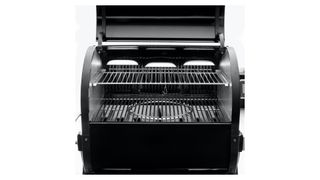
The SmokeFire EX4 boasts a large two-tier stainless steel grate system
Weber SmokeFire EX4 review: design & function
The Weber SmokeFire is available in two sizes, the large EX6 and the smaller EX4, the model we received for this review. Let’s start with the build quality which, as expected from one of the world’s biggest and best BBQ manufacturers, is exemplary across the board, from the beautifully finished porcelain enamelled lid and stiff but tactile opening mechanism to the wide sturdy legs, lockable castor wheels and stainless steel side table for condiments, dishes etc. Make no mistake, this thing is built like a brick shithouse so it should provide many years of use as long as you buy a cover for it – an essential item in this case because of all the electricity components.
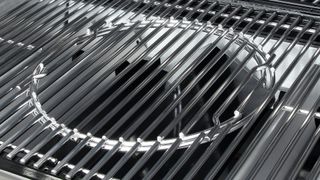
The EX4's main Gourmet grate accommodates a range of cooking inserts
The EX4’s high-quality stainless steel grate measures 46cm X 61cm – big enough for six to possibly 10 – and comes with a ‘Gourmet’ insert to add a wide assemblage of cooking accessories from Weber’s gas and charcoal barbecue ranges. Above it is a narrower warming grate which is best for smoking meats low and slow.
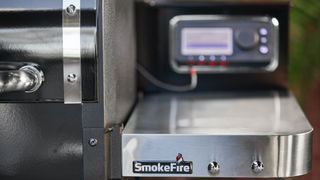
The SmokeFire's digital controller is a doddle to use
The whole shebang is controlled via a push-button LCD interface with four probe ports beneath it. Thankfully, the LCD readout is bright enough to see in direct sunlight and the letters large enough to read without the need for a visit to Specsavers.
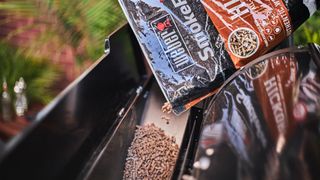
Weber's rear mounted pellet hopper
Now, it has to be said that the first run of SmokeFires did have some teething problems, namely a poorly designed pellet hopper slide that didn’t have a steep enough incline to encourage the pellets into the auger. This has since been redesigned and all SmokeFires currently on sale have been fitted with a steeper hopper slide. That said, I found that I still felt the need to smooth the pellets out to close the cone-shaped hollow the pellets create when they’re nearing their end. In Weber’s defence, I’ve admittedly done this with every pellet barbecue I’ve ever used (it’s an OCD thing, dude).
Another issue that some users have noticed is that heat isn’t as consistent across the grate as they were perhaps hoping. Our test model was indeed a few degrees cooler on the left (we used an Ooni laser thermometer) but not by enough to impact on the cooking. In fact, uneven heat distribution is not only quite common among pellet grills but it’s no bad thing having a slightly lower temperature on one side, especially when grilling. We certainly don’t consider it a deal breaker.
One final fly in the ointment we’ve read about is that pellet ash and fats can clog the drain holes at the bottom which, in some online cases, has resulted in fires around the fire pot. However, this appears to have happened to those who have smoked large cuts for long periods of time. The problem appears to lie in Weber’s decision to forgo installing a large flat metal reflector sheet beneath the grill grate as fitted to the majority of pellet smokers (more on that below). Hence, pellet dust and fats form a gloop that blocks the drainage holes. In some instances, this fat buildup has led to fires around the fire pot. The best work around is to place an aluminium tray filled with a little water on top of the flavorizer bars or putting the cuts on the smaller grate above and putting a water tray on the main grate. Not only does this method keep things cleaner but the water keeps meat moist during the long cooking period. It’s something many smoker chefs do no matter what type of barbecue they’re using.
We should also add that no pellet barbecue will go on functioning properly if it’s never cleaned so our advice is to let the EX4 burn off the fats after each use and wipe away any excessive grease before using it again.

Versatile cooking on the Weber SmokeFire EX4
Weber SmokeFire EX4 review: what’s so different about this pellet grill?
Weber’s completely thrown the rule book out the window with this model and replaced the wide steel heat reflector common to other brands with four equally-spaced stainless steel ‘Flavorizer’ bars – the same as fitted to its gas grills. This means that, at its highest heat setting (315˚C), the edges of the roaring flame in the fire pot below are clearly visible either side of the heat baffle rather than hidden from view behind a plate, and that in turn means any steak thrown on the grill receives a good searing. Indeed, the SmokeFire’s ability to sear steak is one of this product’s biggest selling points. We had a go and sure enough it caramelised the surface of a fillet as if it were slapped on a raging charcoal fire. So top marks there, Mr Webber.
The other main difference between this and other models is that Weber has approached its auger – and more importantly its length and route – from a different design perspective. Instead of a long relatively level auger that can sometimes jam or worse, be the conduit to a hopper conflagration (you don’t want to go there), the EX4’s hopper is short and steeply inclined which in theory means zero hopper fires. We’ll take that.
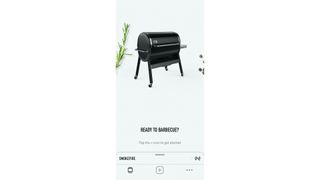
The Weber Connect app could do with some tweaks
Weber SmokeFire EX4 review: Weber Connect app
The first thing you’ll need to do once you’ve assembled the beast (more on that below) is to download the Webber Connect app, link it to the EX4 via Bluetooth (excellent) or wifi (not so good) and download and instal the latest firmware version. This is an important step that shouldn’t be skipped because Webber is always adding extra improvements in functionality.
The Weber Connect app is one area that definitely needs improving, certainly when compared to Traeger’s superbly comprehensive offering. As of writing, the app is pretty thin on recipes, hints and tips but of those recipes that are available, the gist is that you select, say, chicken legs and follow the onscreen instructions from preparation to putting on the grill. Rather handily it’ll tell you to go and relax until it notifies you to turn the food over. And that’s it – a really simple way to grill, roast and smoke. Hopefully the app will be regularly updated with new recipes and made to look a bit slicker like Traeger’s.

Weber currently provides five different pellet woods
Weber SmokeFire EX4 review: it’s all about the pellet
Weber currently produces five types of wood – hickory, apple, mesquite, cherry and a hickory/cherry/maple mix – and we’re sure that more are in the pipeline. Pellets come in 9kg bags and cost around £18 a shot (one bag should last a few sessions). While pellets are readily available online, they’re not the kind of thing you’ll easily find on a Sunday so it’s vital you have enough fuel to hand or your al fresco banquet may end in tears.
Weber SmokeFire EX4 review: assembly
The EX4 arrives in a massive box on a palette which you will be responsible for disposing; the norm for any large BBQ, especially gas models. Thankfully the whole top of the box unclips to expose everything inside. The main part of the unit – the main body, pellet hopper, control panel and side tray – arrives fully assembled. However, there’s still plenty of work ahead – about three hours worth – fitting the legs, screwing on drip trays and handles, etc.
None of this was too taxing because the manual is very well illustrated and each parts box is lettered A,B,C,D etc. At least that was the case until we arrived at the instruction to disassemble the electronic component box and fit the glow plug deep inside the unit’s bowels. Fitting the glow plug turned out to be quite simple in the end but we’re still not sure why Weber didn’t fit it in the first place. We should also add that the legs are so wide they may not go through an average door, so don’t build it indoors unless you have a wide enough portal for it to be taken outside.

Only some barbecuists appear to be practicing social distancing
Weber SmokeFire EX4 review: verdict
Thankfully our test model behaved impeccably in all disciplines. It grilled brilliantly well, it roasted a chicken to crispy perfection and it produced a moist slow-cooked Moroccan lamb replete with tell-tale smoke rings (a pinkish surround on the inside of the meat’s crust). More to the point, it did all this with hardly any input. We simply set the temperature, slapped the food on and left it alone with the lid closed for 90% of the cooking time.
If you hate being chained to the barbecue while your guests are busy getting soused and fancy a pellet BBQ that can grill and smoke as well as sear steaks, then this exemplary model is arguably your best option – on the British market at least. Yes, there are a few niggles with this product – in percentage terms it’s a 95 – but its performance, build quality and outright ease of use far outweigh the foibles in our humble opinion.
•Buy the Weber SmokeFire EX4 in the UK from John Lewis & Partners
Sign up to the T3 newsletter for smarter living straight to your inbox
Get all the latest news, reviews, deals and buying guides on gorgeous tech, home and active products from the T3 experts
Derek (aka Delbert, Delvis, Delphinium, Delboy etc) specialises in home and outdoor wares, from coffee machines, white appliances and vacs to drones, garden gear and BBQs. He has been writing for more years than anyone can remember, starting at the legendary Time Out magazine – the original, London version – on a typewriter! He now writes for T3 between playing drums with his bandmates in Red Box (redboxmusic).
-
 I write about streaming every day but now I'm in one of the biggest shows in the world
I write about streaming every day but now I'm in one of the biggest shows in the worldYou can call me a Kardashian, basically
By Max Freeman-Mills Published
-
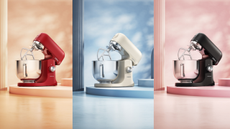 Kenwood redesigns iconic stand mixer in three new stylish colourways
Kenwood redesigns iconic stand mixer in three new stylish colourwaysYou won't be able to stop baking with one of these!
By Lizzie Wilmot Published
-
 Prime Video just added a horror movie I think everyone should watch
Prime Video just added a horror movie I think everyone should watchIf you like small-scale British frights, this is for you
By Max Freeman-Mills Published